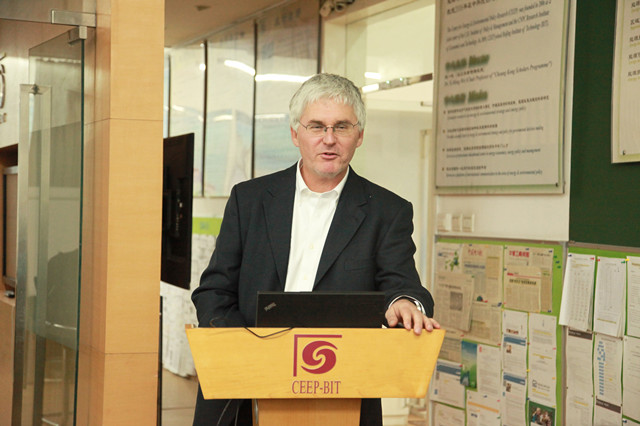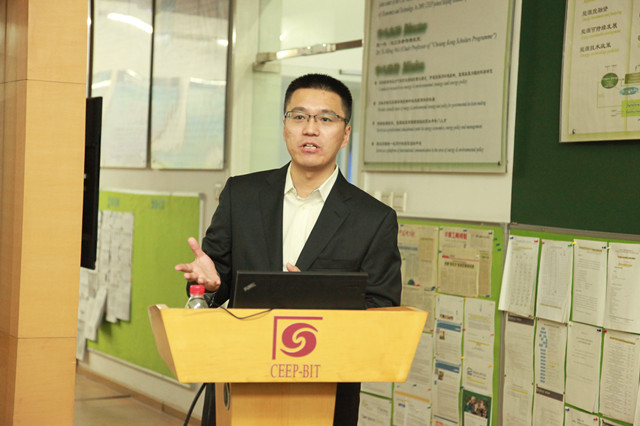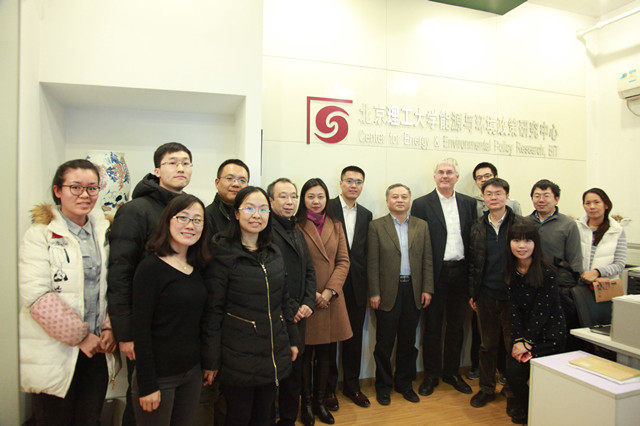

On December 19th, 2016, Prof. Klaus Hubacek and Prof. Feng from University of Maryland. gave a report entitled “Assessing Carbon Inequality from Local to Global” and “China in the Global Supply Chain: Economic gains and environmental losses” at CEEP-BIT. The report was hosted by Prof. Qiao-mei Liang, some other teachers and students attended the report.
Now that about 50% of the global population, more than 3 billion people, live on less than 3$ a day, while the global top 10% earn more than 23$ per day. Clearly lifestyles, consumption patterns and associated carbon footprints differ enormously between rich and poor. Thus in this report, professor Klaus estimates the difference in terms of carbon footprints, hether we will see a convergence of lifestyles and carbon footprints of rich folks across countries, and what would be the carbon implications of moving hundreds of millions of people out of poverty as proposed in the United Nations sustainable development goals.
In a tele-connected world, goods and services consumed in one country are often produced in other countries and exchanged via international trade. China is the world’ largest exporter producing goods for the consumption in developed countries. On the other hand, China’s demand for goods and services is increasingly met by global supply chains involving countries that are situated in far geographical distances. Based on the hypothesis of ecologically unequal exchange, low and middle income countries export natural resources and high impact commodities which allowing richer countries to reduce ecologically harmful industries domestically. In this talk, Dr. Feng presented research on assessing the China’s position in global trade network and unequal exchange between China and the rest of world using value added and several environmental indicators associated with China’s trade relations with the outside world.
Dr Klaus Hubacek is a professor of geographical sciences in the Department of Geographical Sciences, University of Maryland. He is an ecological economist with a research focus on conceptualizing and modeling the interaction between human and environmental systems and developing and modeling scenarios of future change. Dr. Hubacek has worked extensively with stakeholders in participatory research projects and led large interdisciplinary research teams. He has published more than 200 articles in journals, books and research reports on topics such as climate change adaptation and mitigation, participatory modelling, management of ecosystems services, land use change and governance. Dr. Hubacek has conducted studies for a number of national agencies in Austria, China, Japan, UK, and U.S. and international institutions such as the European Statistical Office (EUROSTAT), the International Union for Conservation and Nature (IUCN), and the World Bank. Currently, he is on the advisory board for the City of Shanghai Climate Center in China and for the Sustainable Land Management Program of the German Federal Ministry of Education and Research; he serves on the editorial board of a number of scientific journals and is council member of the International Input-Output Association.

Dr. Feng is an Associate Research Professor in the Department of Geographical Sciences at the University of Maryland, College Park (UMD). He is an expert in spatial economic modeling and related environmental issues. He has rich experience in developing regional, national and global economic models with extension of environmental parameters. He published extensively on ecological-economic modeling in high level scientific journals including Nature Climate Change, Proceedings of the National Academy of Sciences, Global Environmental Change, and Environmental Science & Technology. Much of his research has been highly cited and received public discussion in international media outlets such as The BBC, CBS, Reuters, Science Magazine, Smithsonian, the LA Times, and the Guardian. Dr. Feng has received funding support from many national and international agencies such as NASA, European commission, the World Bank, and National Natural Science Foundation of China, Energy Foundation Beijing Office. Dr. Feng serves as associate editor, guest editor and editorial board member for several international peer-reviewed journals.

After this lecture, teachers and students from CEEP-BIT had a heated discussion with Prof. Klaus and Feng and had a picture taken together.